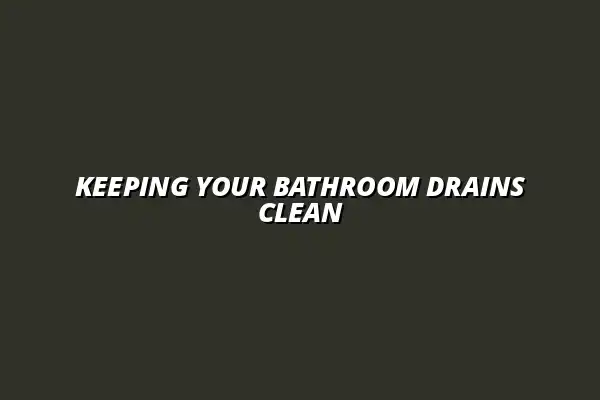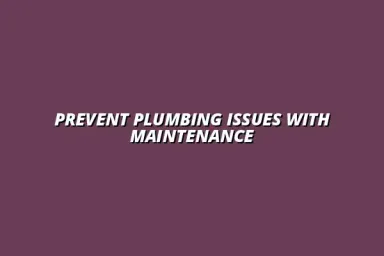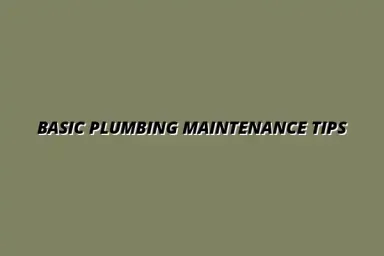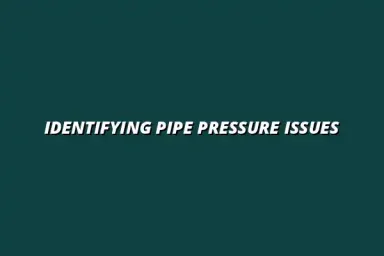Understanding the Importance of Bathroom Drain Maintenance
Bathroom drain maintenance is more than just a chore—it's vital for maintaining a healthy home environment. A clean drain plays a crucial role in ensuring that the bathroom remains a safe and hygienic space. When drains are regularly maintained, they help prevent bacteria build-up and unpleasant odors, making your bathroom a more pleasant place to be! Regular drain cleaning also offers significant benefits, as outlined in this helpful guide on regular drain cleaning benefits.
Additionally, taking care of your drains can save you money in the long run. By investing a little time and effort into maintenance, you can avoid expensive plumbing repairs and potential water damage. Emphasizing the importance of **drain cleanliness** is essential for every homeowner looking to protect their property's value.
The Role of a Clean Drain in Bathroom Hygiene
A clean drain contributes significantly to bathroom hygiene by allowing water to flow freely. When water drains properly, it minimizes the chances of mold and mildew growth, which can lead to health issues. Proper drainage also helps in keeping the bathroom smelling fresh and clean, preventing that musty, stale odor that often lingers in neglected spaces. For more tips on keeping your bathroom drains flowing smoothly, check out these maintenance advice tips.
- Prevents bacteria from growing in stagnant water.
- Reduces the risk of mold and mildew.
- Keeps your bathroom smelling pleasant.
Moreover, regular maintenance ensures that any potential issues are caught early, saving you from a bigger headache later on. Think of it as a small investment in your overall bathroom health!
Consequences of Neglecting Drain Cleaning
Neglecting to clean your bathroom drains can lead to a host of undesirable consequences. Over time, clogs can develop, causing water to back up and create unsanitary conditions. This not only affects the functionality of your bathroom but can lead to serious plumbing issues that require expensive repairs. Learning how to unclog your bathroom drain easily can prevent many of these problems.
- Increased risk of flooding in the bathroom.
- Potential growth of mold and harmful bacteria.
- Unpleasant odors that linger in the air.
In short, ignoring drain maintenance isn't just a minor inconvenience; it can significantly impact your home's hygiene and safety. So, keeping those drains clean should be a top priority for every homeowner!
Identifying Common Issues with Bathroom Drains
Being aware of common bathroom drain issues can help you tackle problems before they escalate. Knowing what to look for can save you time, money, and frustration. The sooner you identify these issues, the easier it is to keep your drains functioning smoothly!
Common issues often include slow drainage, unpleasant odors, and various types of buildup. By familiarizing yourself with these signs, you can act quickly and maintain a healthy bathroom environment. If you're dealing with slow draining pipes, you can find solutions and advice on how to fix slow draining bathroom pipes.
Recognizing Signs of Clogged Drains
Clogged drains can be a significant pain, but recognizing the signs early can help you avoid a major disaster. The first sign to watch for is slow draining water. If your sink or shower takes longer than usual to drain, it’s a telltale sign that something is blocking the flow.
- Water pooling in the sink or bathtub.
- Gurgling noises coming from the drain.
- Frequent need to plunge or snake the drain.
Another sign is unpleasant odors emanating from the drain. This could indicate the build-up of waste or bacteria, which can pose health risks. Keeping an eye on these signs is key to ensuring your bathroom remains a clean and welcoming space!
Slow Draining Water
Slow draining water is often the first indication of a drainage issue. It can happen for various reasons, including hair accumulation, soap scum, and other debris. If you notice the water lingering in your sink or shower, it’s time to investigate further! Preventing clogs in your bathroom sink pipes is crucial, and you can find helpful tips and solutions on preventing bathroom sink pipe clogs.
- Check for visible blockages in the drain openings.
- Use a plunger to dislodge minor clogs.
- Consider using a drain snake for deeper clogs.
Addressing slow drainage promptly can prevent further complications down the line. It’s always better to act sooner than later!
Unpleasant Odors
If your bathroom has developed a foul smell, it can often be traced back to your drains. Stagnant water or buildup can create unpleasant odors that permeate the air. If you've noticed a strange smell, it’s crucial to investigate and clean your drains as soon as possible!
- Check for any food particles or debris stuck in the drain.
- Consider pouring boiling water down the drain to help clear any buildup.
- Use a mixture of vinegar and baking soda for an eco-friendly deodorizer.
Addressing these odors not only improves hygiene but also creates a more enjoyable bathroom experience. After all, who wants to deal with a smelly bathroom?
Understanding Different Types of Bathroom Drain Issues
Understanding the various types of bathroom drain issues can equip you to handle problems effectively. Two of the most common culprits are hair buildup and soap scum accumulation. Both of these can create significant clogs if not addressed promptly.
- Hair tends to gather in the drain and can quickly become a severe blockage.
- Soap scum builds up over time and can restrict water flow.
- Regular cleaning can prevent these issues from becoming a nuisance.
By recognizing these common problems and acting on them, you can keep your drains in tip-top shape and avoid unnecessary headaches!
Hair Buildup and Soap Scum Accumulation
Hair and soap scum are notorious for causing bathroom drain issues. They can combine to form stubborn clogs that disrupt the flow of water. It’s important to regularly remove hair from drain covers and to use drain catchers to minimize the buildup.
- Use a drain catcher to prevent hair from entering the drain.
- Regularly clean the drain cover to remove any trapped debris.
- Consider using a weekly cleaning solution to keep soap scum at bay.
Addressing these common problems can significantly improve the performance of your bathroom drains!
Mineral Deposits from Hard Water
Another issue that can plague bathroom drains is mineral deposits, especially if you have hard water. Over time, these deposits can build up and cause blockages. Regular cleaning can help minimize the impact of hard water on your plumbing!
- Use vinegar to dissolve mineral deposits in your drains.
- Consider installing a water softener to reduce the mineral content.
- Regularly check and clean your faucet aerators and showerheads.
Taking these steps can help keep your drains flowing freely and extend their lifespan!
Advanced Tips for Long-Term Drain Health
To keep your bathroom drains functioning smoothly over time, I’ve gathered some advanced tips that can truly make a difference. Regular maintenance and adopting better practices can help prevent serious issues down the line. It's worth investing a little effort now for the benefit of a hassle-free experience later! For comprehensive home plumbing maintenance, explore these essential tips: Essential Plumbing Maintenance for Homes.
One effective approach is to consider professional services when you encounter persistent problems. These experts have the tools and experience needed to tackle the toughest clogs and ensure your drain is functioning optimally! If you need a plumber in Great Barr, Birmingham, consider checking out PlumbProCare's services.
Professional Drain Cleaning Services
It’s important to know when to call a plumber for help. If you notice recurring clogs or strong odors that don’t seem to go away, don’t hesitate to seek professional assistance.
- Recurring clogs that don’t respond to DIY methods.
- Persistent bad odors emanating from drains.
- Water backing up in multiple drains simultaneously.
When you reach out for professional services, understanding what to expect can ease your worries. Typically, they’ll perform a thorough inspection, use specialized equipment, and may even offer maintenance tips specific to your situation!
What to Expect from Professional Services
Professional drain cleaning can vary based on the issue at hand, but here’s a general idea of what you can expect:
- Initial assessment and diagnosis of the problem.
- Use of high-pressure water jets or snakes for effective cleaning.
- Advice on future maintenance to prevent further issues.
These services may save you time and provide peace of mind knowing your drains are in capable hands!
Upgrading Your Bathroom Drain System
Another way to promote long-term drain health is by upgrading your drain system. High-quality materials and designs can significantly reduce future issues, making your maintenance efforts easier and more effective.
Consider investing in better drain covers and filters. These can help catch debris before it enters your plumbing system, drastically reducing the chances of clogs!
Exploring High-Quality Drain Covers and Filters
Here are some options that can protect your drains:
- Mesh drain covers to catch hair and larger debris.
- Anti-clog shower heads that minimize residue buildup.
- Drain strainers that can easily be cleaned and reused.
Using these products consistently can extend the life of your drainage system!
Investing in a Modern Drain System
If you're facing continual drain issues, it might be time to consider a modern drain system. Today’s products are designed with better materials and features to promote easier flow and less buildup.
- Upgrade to larger drain pipes that can handle more volume.
- Consider systems with built-in filters designed to capture debris.
- Explore smart technology that alerts you to potential issues.
Such investments can be a game-changer for your bathroom's functionality.
Addressing Common Questions about Drain Maintenance
You might have some questions about how to best maintain your bathroom drains. Let's tackle a few of the most common concerns to help clarify your doubts!
How Often Should Bathroom Drains Be Cleaned?
A good rule of thumb is to clean your bathroom drains at least every three months. However, this can vary based on usage and whether you have pets or long hair, which can cause more buildup over time.
Are Chemical Drain Cleaners Safe for Household Use?
While chemical drain cleaners might seem effective, they can be harsh on your plumbing and the environment. Instead, consider natural alternatives that are often safer and just as effective!
What to Do if Home Remedies Don’t Work?
If your homemade solutions aren’t cutting it, it’s best to reach out to a professional. They have specialized tools and expertise that can address stubborn clogs more effectively than most DIY methods!
Incorporating Preventative Measures for Drain Longevity
To maintain the health of your bathroom drains, it’s essential to adopt preventative measures. Establishing routine habits can greatly reduce potential problems and keep your plumbing system running smoothly!
Routine Maintenance Habits to Adopt
Here are some simple yet effective habits to incorporate into your cleaning routine:
- Regularly clean drain covers and traps to remove any buildup.
- Monitor water flow and catch any unusual slowdowns early.
These small efforts can make a big difference in the long run!
Regularly Cleaning Drain Covers and Traps
Make it a habit to check and clean your drain covers every month. This simple task can prevent clogs from forming and save you from more extensive cleaning later!
Monitoring Water Flow and Drainage Patterns
Keep an eye on how quickly water drains in your sink or shower. If you notice any slow drainage, it’s often a sign you need to clean the drain sooner rather than later!
Educating Household Members on Drain Care
It’s crucial to communicate the importance of proper drain usage to everyone in your home. This team effort can significantly impact your drain's longevity and health!
Best Practices for Reducing Drain Clogs
Here are some practices everyone should follow:
- Avoid flushing items like wipes, cotton swabs, or hair down the drain.
- Use a catch-all to collect hair and debris in the shower.
- Encourage everyone to report any slow drains immediately.
When everyone is on board, you’ll see a noticeable improvement in your drains!
Communicating the Importance of Proper Drain Usage
Discussing drain care with family members can lead to better habits. Emphasize how these practices can save time, money, and hassle in maintaining their home!
Final Thoughts on Bathroom Drain Maintenance
In summary, keeping your bathroom drains healthy doesn’t have to be a daunting task. With the right maintenance strategies in place, you can prevent clogs and enjoy clean, functioning drains.
I encourage you to regularly assess your drains, utilize DIY cleaning methods, and seek professional help when needed. This proactive approach will certainly pay off in the long run!

 Kiran Almasi
Kiran Almasi

